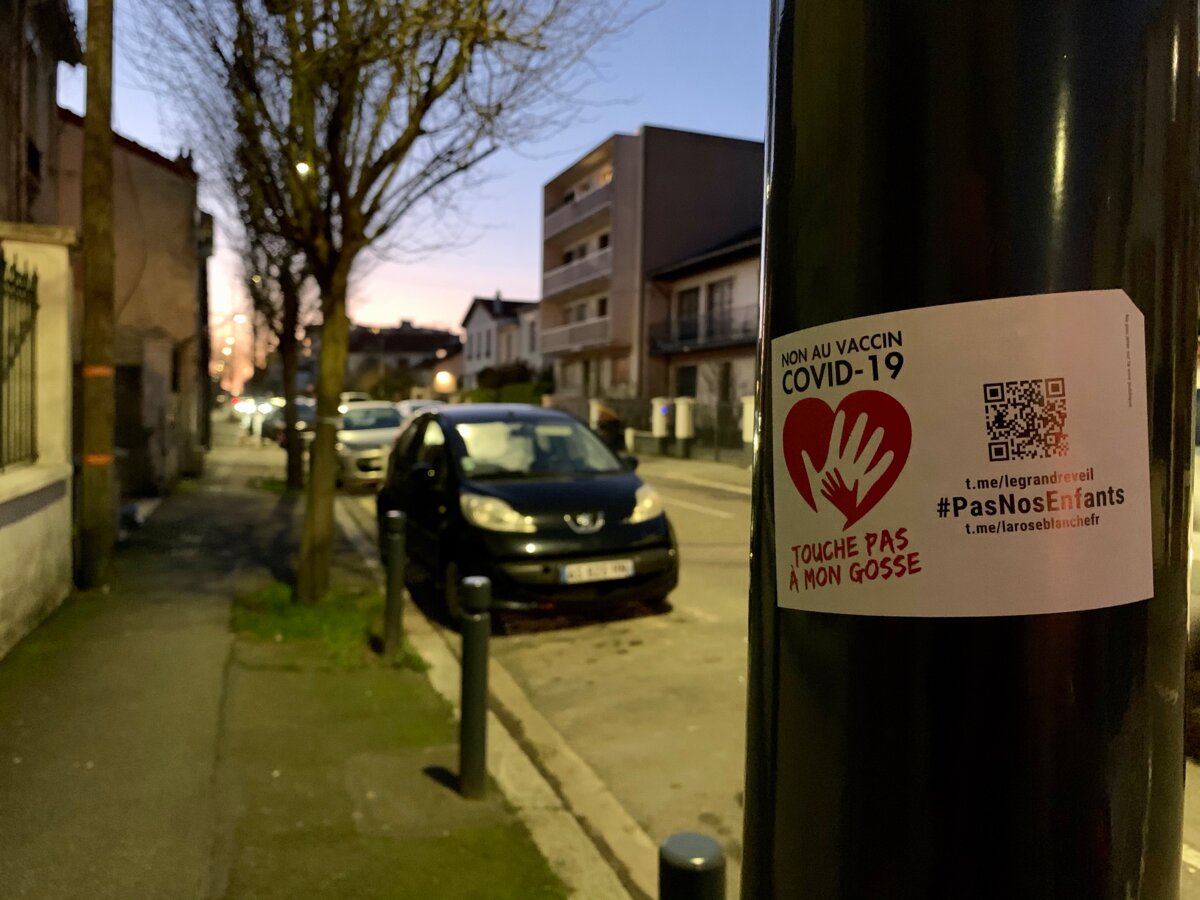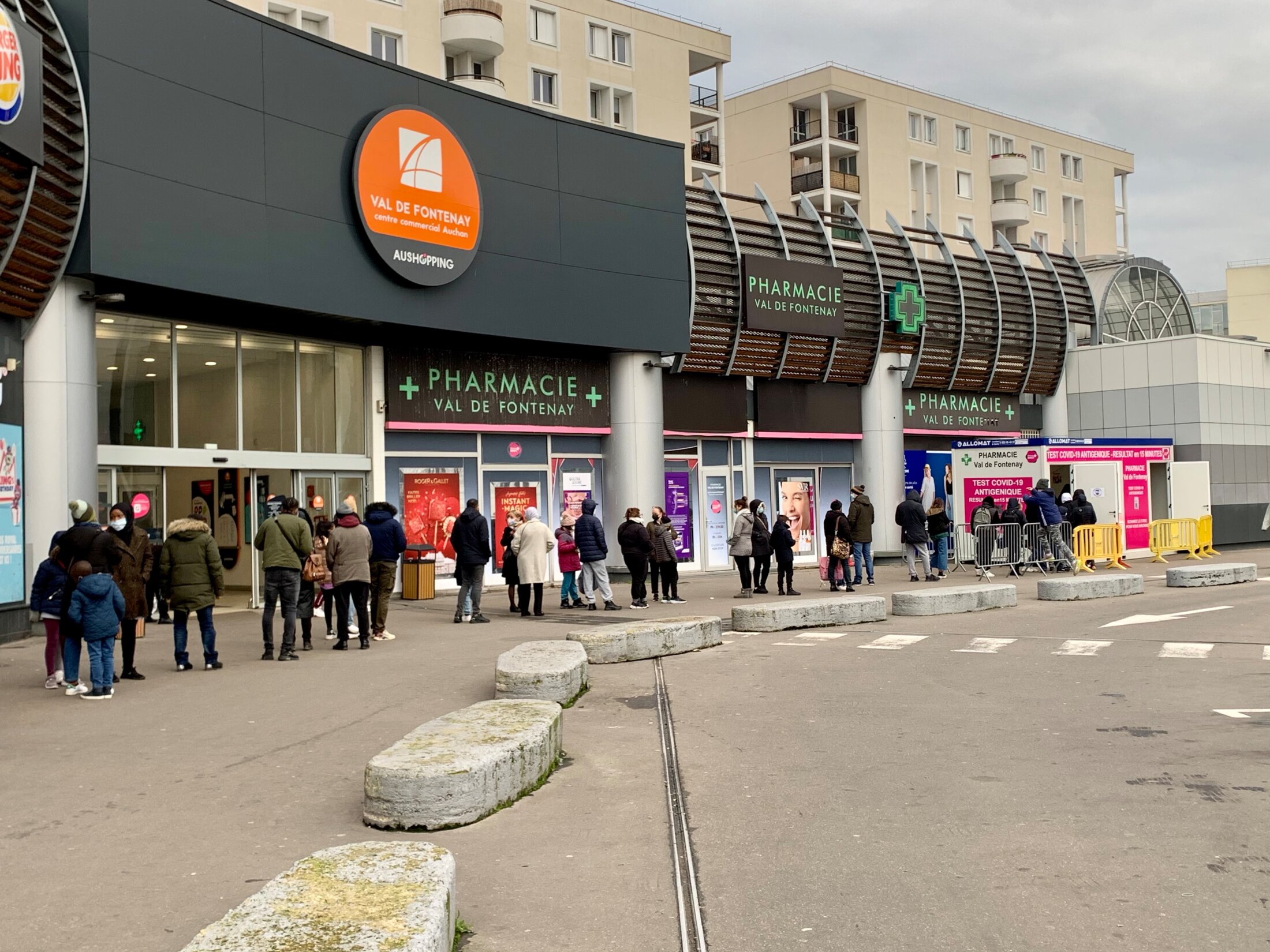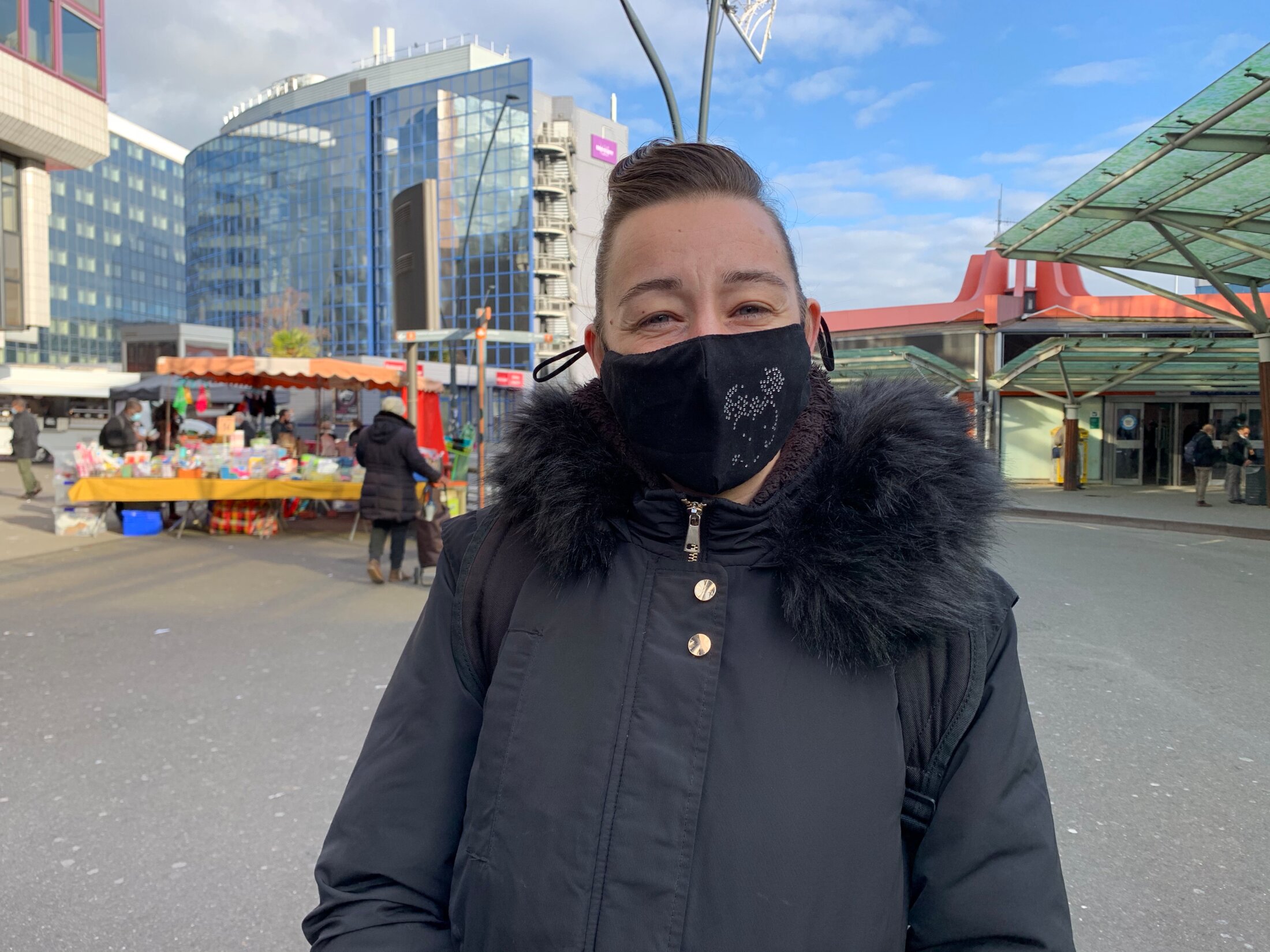It is Wednesday January 5th and the queue in front of the pharmacy in rue d'Avron in Paris's 20th arrondissement or district is not getting any shorter. The customers enter the dispensary one by one and then re-emerge clutching a form in their hands. The male pharmacist, dressed in a lab coat and protective hat, gives a sign for the next person to enter the small blue tent that has been a fixture on the pavement for several months. “Are you ok, he didn't hurt you?” asks 'Sophie' – not her real name – from among the line of waiting customers. “Last time, the woman pharmacist put the swap right to the back of my head,” said the fifty-something woman miming the gesture with a smile, a blue scarf wrapped around her neck.
This employee in a local supermarket is on her fourth test since the start of the pandemic but has not yet chosen to have a vaccination. “I'm too afraid. My brother, who is diabetic, was really ill for a week after getting the vaccine. A female friend was paralysed down the left side of her face for two months. None of that reassured me,” she said. But with the advent of the Omicron variant of Covid, which is less virulent but more infectious than others, around 40 positive cases have been reported at her workplace. “There's everything there you need to protect you, the communal areas are regularly disinfected. But with this variant everyone catches Covid. My doctor advised me to do a PCR test after the antigen [lateral flow test] to be sure of the result.”

Enlargement : Illustration 1

The comment the day before from President Emmanuel Macron, who declared in Le Parisien newspaper that he wanted to “piss off the unvaccinated” (see Mediapart's op-ed on this here) left her unmoved. “For someone who's afraid, it's quite violent to hear that, we get singled out but you can't control fear,” Sophie noted. “Everyone reacts differently. In time perhaps we'll decide to get vaccinated. But forcing us isn't the answer.” In fact, on December 9th Sophie had been due to get her first dose in a nearby vaccination centre but she cancelled the appointment two days before. Her husband and children are all vaccinated. She continues to hesitate but asks: “Some colleagues have had three doses and have still got Covid. So why get vaccinated?”
“His comments shocked me”
Late that day, Cécile makes herself a tea before settling into her sofa at her home in Montreuil in the eastern Paris suburbs. As music from around the world plays in the background, and with the lighting subdued, the primary school teacher and mother-of-two starts by explaining she does not consider herself an “unvaccinated” person, pointing out that she has had all other existing obligatory vaccines. Instead she refers to a section of society being “abused”, “ostracised” and used as a “scapegoat”.
Wanting to strip away our citizenship and accusing us of being irresponsible is extremely serious
“Macron wants to inflame the situation and do all he can so that people hate us. His comments shocked me: wanting to strip away our citizenship and accusing us of being irresponsible is extremely serious. It's not the first time that he has shown contempt for people with unacceptable phrases,” she said, adding that his subsequent apologies, during an interview on TF1 television news, were not “sincere”.
In Cécile's view the health crisis has become a political one. She has refused the “injection” - she refuses to call it a vaccine - because aged 43 and with no comorbidities she does not consider herself to be at risk. “I base it on simple medical principles: you don't start mass vaccination in the middle of an epidemic. And then the messenger RNA [editor's note, mRNA, the technique used notably in the Pfizer-BioNTech and Moderna vaccines] is no trivial matter. My mother studied biology and warned against that,” she said, adding that she had read “a lot” since April 2020 and the start of the pandemic. “For me it's really a question of freedom. The implementation of the health pass [editor's note, that was needed to allow access to numerous locations and required proof of vaccination or a negative test] in July was scandalous and caused massive segregation.”
Since the summer of 2021 this former dancer and costumer designer, who studied the history of art, has boycotted everywhere that demands the health pass to get in. She also vows not to set foot in a museum, despite the importance of culture for her, while one is required. In the meantime she goes to the bars who are “resisting”, in other words who do not ask to see the health pass; though she said she takes a fake health pass there in order not to get the bar owners in trouble if there is a spot check.
Cécile also expects that one day she will not be allowed to teach without being vaccinated against Covid-19, and says she is ready to join an alternative school if necessary, or to go and live in the countryside. “Nurses were raised to the status of heroes and today those who refuse the injection are being left to starve. I'm ready to take it right to the bitter end,” she said.
With the vaccine pass I feel that we're toppling over into something that's a lot more violent in terms of our freedoms
The previous day Cécile had managed to get a certificate exempting her children from wearing a mask. She does not wear one herself either. Likening her approach to civil disobedience, the teacher says that she regularly meets up with people in her area who are unvaccinated to “discuss” issues. In the street outside a poster stuck to a lamppost gives an idea of the mood: “No to the Covid-19 vaccine. Hands off my kid.” Cécile herself said: “The country and democracy are not in good shape, I can't accept my children growing up in a controlled society. We will fight to stop that happening.” Together with other defendants, and supported by a lawyer, the teacher is ready to sue for defamation over Emmanuel Macron's comments. “There's no reason why we should not defend ourselves. But we're doing it legally,” she smiled, her fringe tumbling over her forehead.
She was planning to take part in a planned demonstration against vaccine passports in Paris on Saturday January 8th, along with her house mate Laurent who has not attended this kind of protest before. Having been “reluctant” about the idea of getting vaccinated from the start, this freelance video maker wanted to take his time before committing himself. “It was devised quickly and that didn't reassure me,” he said. “I also saw that the messenger RNA was not the normal technique for making a vaccine.” Last summer, just as he was “almost ready” to take the plunge, the health pass was brought in by the French government. He was irritated by what he saw as an “order” imposed from on high. “Before that it wasn't something I was particularly committed about. I was simply hesitating and waiting to see how things developed. But with the vaccine pass [editor's note, which requires proof of vaccine only and no longer a negative test , and which was passed by the National Assembly on January 6th 2022] I feel that we're toppling over into something that's a lot more violent in terms of our freedoms.”

Enlargement : Illustration 2

Laurent, who is in his 30s, says he is “disgusted” by the “toughening” of the state's approach and feels he is being stigmatised. He also attacks what he calls the “radicalisation” in the president's comments in which he detects a pre-election strategy that aims to “galvanise his own troops” and split society into two camps. “There will be the antis and the pros … I find that unacceptable. I'm not against the vaccine. For frail people I think it makes sense, but not for children and young people in good health. I'm against the vaccine being imposed on the entire population,” he said. At the end of December Laurent tested positive for Covid and had to self isolate. “I was almost happy, I told myself that I'd have the pass for six months and I'd have some peace [editor's note, the health pass, which predated the new vaccine-only vaccine pass, could be obtained if you could prove you had had Covid within the past six months]. It's sad that it had come to that! In the end the vaccine pass and Macron's comments have given me the desire to be more radical.”
On Thursday January 6th the queue in front of the chemist at the shopping centre in nearby Fontenay-sous-Bois also shows little sign of getting shorter. The text written on a deep pink background on the prefabricated hut invited passers-by to come and get tested, promising the results within 15 minutes. Not far away Gwendoline was dropping her children off with a family member who was going to look after them.
A former waitress at a restaurant very close to the Val-de-Fontenay railway station, she chose to change jobs and become a kitchen assistant and do the dishwashing so that she could avoid having to get vaccinated. “My initial concern was about being treated as a guinea pig. But most of all, when he was aged one, my son developed an autoimmune illness called Nephrotic syndrome after he received three vaccines at the same time. Since then I've been very afraid of vaccines,” said the woman in her 30s. She insists that a professor at the hospital “implicitly” acknowledged the link between the vaccines and her son's disease.
They stigmatise us, we feel despised, as if we were stupid, whereas it's not about stupidity, it's about opinion and convictions
With the agreement of her employer, Gwendoline tests herself every day so that she is able to carry on working there. While insisting she is not “anti-vax” or “anti-pass”, and fully aware of the dangers of the virus – one of her friends died on December 1st after contracting it – she is “reluctant” and expects people to respect her choices.
From health crisis to political crisis
“They stigmatise us, we feel despised, as if we were stupid, whereas it's not about stupidity, it's about opinion and convictions. We're in one of the rare countries that defends equality and liberty and if we lose that then we lose France's heart and soul,” said Gwendoline, who found Emmanuel Macron's comment's “disrespectful”. She added: “A president of the Republic is not there to 'piss off' his people but to help them. By speaking that way he has thrown fuel on the fire at a time when slowly but surely the country is becoming divided.”

Enlargement : Illustration 3

David, aged 46, makes a similar observation. “Macron is creating division and hate. From a health crisis we are moving to a political crisis and a crisis of trust. They are discrediting opponents and there's been a ramping up when it comes to removing freedoms,” noted David, who is an artistic director in public relations at Montreuil. He added: “I don't have the feeling of being protected but rather of being persecuted, even fought against. They caricature us in order to discredit our choices and we then become responsible for others' misfortunes in this pandemic.” David says he would have liked more time being given to observe the science - with which he has “no problem at all” - but he remains wary of the mRNA technique in vaccines.
I test myself twice a week to protect those around me
He also says that he lacks “clear data” on what is happening, taking as an example someone close to him who had “serious side effects” - paralysis – after their vaccination. Others close to him have also become “very ill” after their second dose. “I myself was infected a month ago, probably by a vaccinated person in my sports group. I regret the fact that while stigmatising us the government is not making more effort to limit the epidemic, by boosting access to tests for all, including the unvaccinated, for example,” said David. “I do tests twice a week to protect those around me, as does my 14-year-old son for his sports sessions. I fear that will no longer be possible for him and that he won't be able to go to the cinema or museum and educate himself. It's very sad,” he said.
---------------------------------------------------------------------------
- The original French version of this article can be found here.
English version by Michael Streeter


